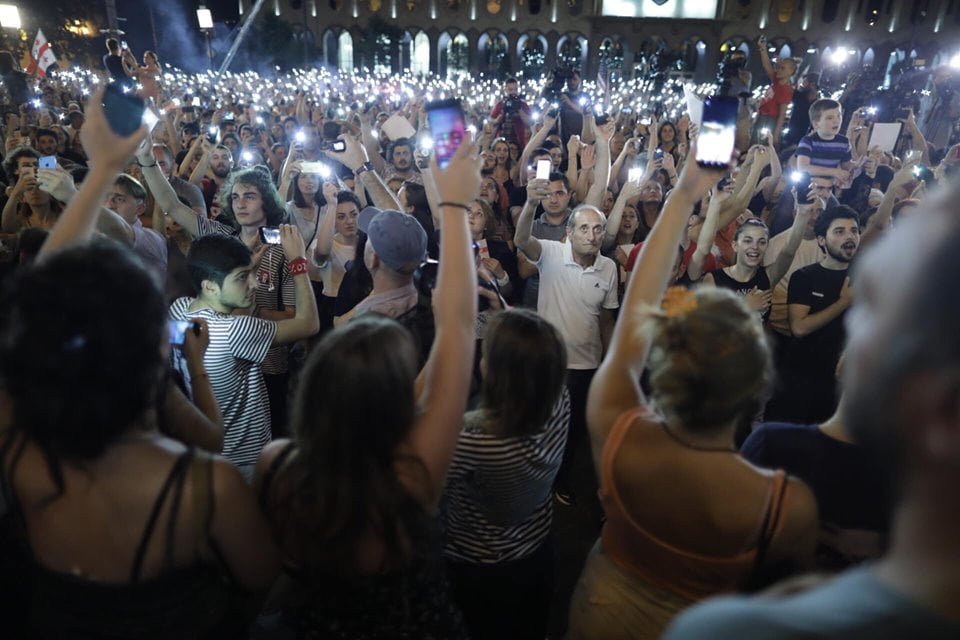Several Georgian youths lost their eyes during the rubber bullets, used during police crackdown the night of June 20. We cannot give them their eyesight back, but we can make those responsible for collaborating with Russian policies pay a high political and legal price. We have the passion and the protest charge. What we need now, is strategy.
Thousands of people hit the streets during the past three days. They came out to change the country, and the resignation of the Parliament Speaker Irakli Kobakhidze and a back-bencher MP Zakaria Kutsnashvili who was designated responsible for the diplomatic faux pas is not an appropriate answer to their anger.
The protesters want to achieve an end to the vicious cycle of authoritarianism, collaborationism with occupying power, and irresponsible governance.
A civic protest – however large, sincere, and justified – cannot hope to achieve such ambitious political objectives without a political strategy. History is littered with cases of just causes abandoned for the lack of strategy and poor organization.
Strategizing is especially complicated, since the people who gathered at the Parliament these past three days are a pluralistic and diverse group. Moreover, their numbers were swelled by the promise of “non-partisan” protest, and many claim to be “apolitical”.
Yet, without a clear political agenda and objectives, the protest would only serve to vent frustration and anger, but won’t result in systemic and political change that most participants call for.
It is clear, that neither Speaker Kobakhidze, nor especially MP Kutsnashvili, who left their posts in the wake of the protest, had any real political weight. To bring change, the political responsibility must fall where the political center of gravity is.
Apparently, many in the government hope, that this “apolitical” protest would will fizzle out in Tbilisi’s summer heat.
If the process is disorganized, and has no clear objectives the protesters will grow tired, and the protest would be easy to stem. The initial mobilization would weaken, inevitable differences of opinion and position will emerge, egged on by agents’ provocateur and multiplied by social media.
This creates an urgency for the protesters to agree on key political action points.
Firstly, the political demands must be clearly formulated. Resignation of the interior minister, release of the protesters detained during the night of 20-21 June, and holding of the 2020 general elections under full proportional system seem to form the basis of a general consensus, which is a very good beginning.
An agreement on political objectives is just the first step, shall be followed by resolving organizational points. The emotional momentum was significant enough to push the protests into their fourth day, but won’t last for the time required for attaining stated political objectives. At least minimal organizational structure must be put in place.
The third crucial point is to decide on the course of action, if the government refuses to meet the protesters’ demands. Ineffective ultimatums breed disappointment, so the demands must be chosen and shaped carefully, with further steps of action in mind. Any civic protest requires a plan for peaceful, gradual and lawful escalation to mobilize supporters and to put pressure on the government at critical points and at the right time.
Another complicated point is how to build relations with political parties. Staying above partisan squabbles is an appealing proposition, but it would be short-sighted to ignore the wealth of knowledge, experience and resources that Georgia’s political parties have.
The protesters’ assumption that seeing the party leaders in charge of protests could reduce mobilization is very likely accurate, given the general public disenchantment with the political class. But since opposition parties are well represented in the parliament, they have a crucial asset, not to be squandered.
Also, despite justified public skepticism, it was the opposition MPs who barred Russian MP Gavrilov from sitting in the Georgian Parliament Speaker’s chair. If it were not for their resolve, Mr Gavrilov would have waltzed off to the reception, and those very people who were forced out of their posts, would have likely received accolades for an international shenanigan well managed.
And finally – external communication, especially with international community, is crucially important, too. There would be numerous attempts at discrediting the protest, and the organizers are yet largely unknown to Georgia’s foreign partners. The protest needs its faces, who engage in adequate, effective and regular communication with the diplomatic corps, international organizations and embassies.
These are formidable challenges, especially since the protest has no single organizing force. Diversity and democratic process are the current protests’ strengths, but it also presents a crucial organizational challenge. Luckily, by now Georgia has long experience with peaceful protest, and today’s protesters stand on the shoulders of previous generations.
The political dilemma is to resolve this crisis with minimum damage to the country, so that Georgia moves as smoothly as possible towards more fair and functional political system.
Finding a broad consensus on these strategic and organizational issues might be the most decisive challenge for the pro-democratic civil society and political community at this stage.

